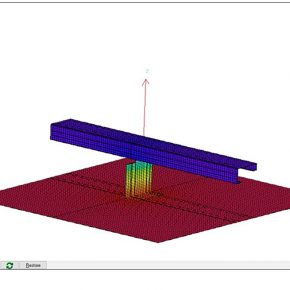
GUEST ARTICLE: Collaboration is key to mitigating carbon emissions
Definitions and standards across the construction sector are rapidly evolving to ensure consistency when striving to meet net zero goals. A new report, produced by Prologis UK and Planet Mark, sets out a model for emissions reduction and mitigation for logistics property developers and others in the construction industry. This piece is from Martin Cooper, vice president of Project Management at Prologis UK…
“On average, the whole-life carbon emissions of a typical distribution centre are around 30 per cent operational (the amount of carbon emitted during the operational or in-use phase of a building) and 70 per cent embodied (the emissions produced as a result of the materials and manpower used during the building process).
Considerations for reducing operational emissions include giving attention to energy efficient design and optimising use of onsite renewables. On the other hand, while it is possible to reduce embodied carbon emissions through careful material selection and use of energy-efficiency construction methods, it can never be entirely eliminated.

Despite this, the report shows how a sustainability model put in place by Prologis UK and Planet Mark has mitigated more than 100 per cent of the unavoidable embodied carbon emissions for 74 projects.
The report highlights the importance of engaging directly with the project design team, main contractor, and the supply chain to find ways to reduce or mitigate carbon emissions. The tried and tested model focuses on a three-step programme of measurement, engagement, and communication to ensure consistent delivery across each project.
Measurement
The whole-life carbon emissions for each project were measured in relation to a notional baseline using a lifecycle assessment (LCA). The LCA adheres to strict standards and methodologies. As a goal, the project team requires a minimum 2.5 per cent reduction of the building’s embodied and operational carbon emissions compared to the notional baseline.
Engagement
Engaging with stakeholders across the supply chain is crucial to raise awareness of the importance of sustainability and working together to reduce or mitigate carbon emissions. As well as measuring their success in terms of delivering against sustainability goals, the report quantifies the social value generated by the 74 projects assessed, which includes everything from job creation to community engagement initiatives.
Communication
Communication is integral to the Planet Mark certification process and plays an essential part in increasing awareness of sustainability issues and encouraging action. The sustainability model outlined in the report focuses on accountability and ensuring a high level of integrity, trust, and transparency across all projects.
The report underlines the difference that the sustainability model can make. By following this process across 74 projects spanning more than 19 million sq. ft. of development, Prologis UK has reduced its whole-life carbon emissions by 25 per cent (476,819 tCO2e) on average over a 15 year time period.
Furthermore, through its innovative carbon mitigation scheme, Prologis UK has mitigated unavoidable carbon emissions through its investment in large-scale rainforest protection programmes to avoid deforestation and lock-in carbon, through a partnership with global climate change charity, Cool Earth.
The report quantifies the positive impact that the collaborative sustainability model has had over the past 15 years; mitigating total embodied carbon emissions of 879,158 tCO2e through the protection of 17,683 acres of ‘at risk’ rainforest. This has prevented the loss of 4.1 million trees to deforestation, which would have resulted in potential emissions of 4.8 million tCO2e.
With the drive to raise sustainability standards across the industry, it is important that developers and other construction sector businesses share their experiences and expertise. Collaboration is key and by working together, the industry will establish best practice on route to net zero by 2040.”
Latest news

26th July 2024
Enfield Speciality Doors completes world-class project for Atlas Copco HQ
A rundown office and warehouse building completely transformed into a modern headquarters for Atlas Copco has been fitted with more than 120 internal fire doors from Enfield Speciality Doors.
Posted in Access Control & Door Entry Systems, Articles, Building Industry News, Building Products & Structures, Building Systems, Case Studies, Doors, Interior Design & Construction, Interiors, Posts, Restoration & Refurbishment, Retrofit & Renovation, Security and Fire Protection, Sustainability & Energy Efficiency, Timber Buildings and Timber Products, Wooden products
26th July 2024
Abloy UK launches new white paper
Abloy UK, a leading provider of security and access control solutions, has launched a new white paper.
Posted in Access Control & Door Entry Systems, Architectural Ironmongery, Articles, Building Industry News, Building Products & Structures, Building Services, Doors, Facility Management & Building Services, Health & Safety, Information Technology, Innovations & New Products, Publications, Research & Materials Testing, Security and Fire Protection
26th July 2024
MCRMA Member Profile: David Roy, Director of Roofconsult
David Roy of MCRMA member company Roofconsult has more than 50 years’ experience to draw upon working in the building envelope sector and a unique perspective on how it has changed in that time.
Posted in Articles, BIM, Infrastructure & CAD Software, Building Associations & Institutes, Building Industry News, Building Products & Structures, Building Services, Building Systems, Cladding, Information Technology, Restoration & Refurbishment, Retrofit & Renovation, Roofs, Walls
26th July 2024
Strand: Enhancing Door Functionality and Safety
Craig Fox, Sales Director for Strand Hardware, outlines how door industry professionals might apply door limiting stays…
Posted in Architectural Ironmongery, Articles, Building Industry News, Building Products & Structures, Building Services, Doors, Facility Management & Building Services, Health & Safety, Restoration & Refurbishment, Retrofit & Renovation
 Sign up:
Sign up: